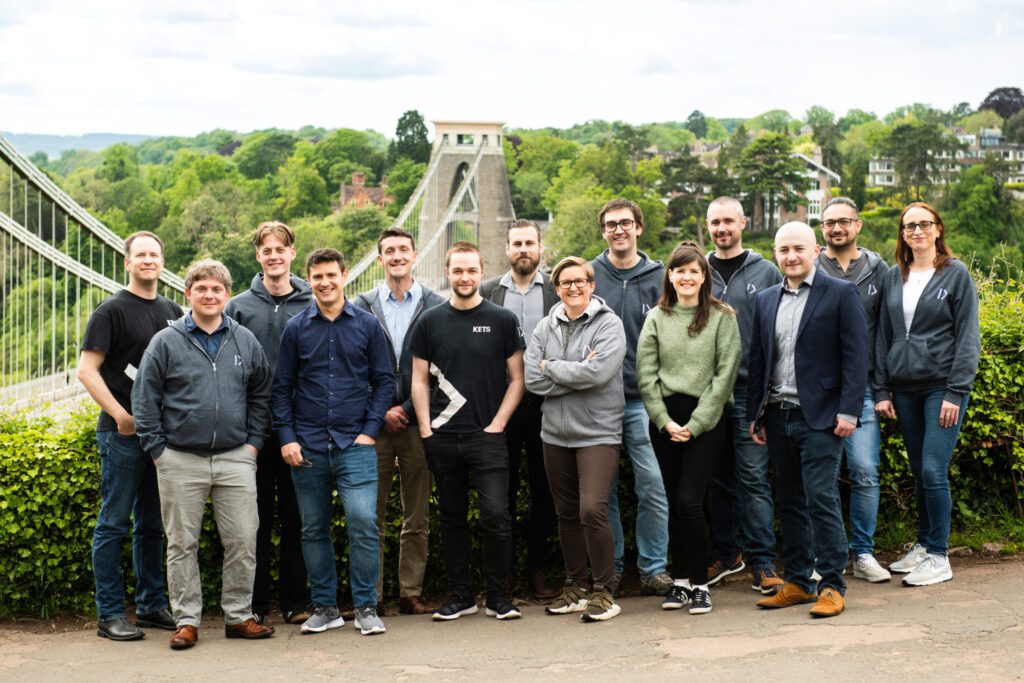Cyber
Quantum
What does the UK’s Cyber Resilience Bill really mean for a quantum security future?
Reading time: 7 mins
We speak to one of the UK’s leading quantum companies about transforming cybersecurity with unbreakable encryption
Quantum computing will break the internet. And just about everything else… But only if it’s left unchecked. That’s where KETS, a Bristol-based quantum security business, comes in. KETS imagines another scenario, one where the internet doesn’t actually break and that banks, utilities, and government departments keep on running as normal.
KETS uses Quantum Key Distribution (QKD) to protect digital networks in diverse sectors, such as financial services, government and defence, telecommunications, and data centre security. The company recently won a £1.7m contract, funded by Innovate UK, to accelerate the development of its QKD. The company has now raised £9.7m of R&D grants and equity investment, since it was founded in 2016.
“Our QKD usually takes the form of two boxes connected by fibre optics,” explains Tom Crabtree, senior business development manager at KETS. “Box A, Alice, generates a digital key, encodes it onto a stream of photons, and pings it across to Bob on the other side. But if someone tries to interfere with those photons – i.e. to try and learn the key – then it changes their state, it comes out garbled, and an alarm goes off.”
The initial work behind KETS was part of an international collaboration – between the University of Glasgow, NICT in Japan, and the University of Bristol’s Quantum Engineering Technology Labs (QET Labs) – where Philip Sibson, Chris Erven, and Mark Thompson (three of KETS’ five co-founders) were among a research group that developed quantum microchips. These microchips could distribute uncrackable key pairs using the quantum properties of superposition and absolute randomness.
“Chris [Erven] had done some work at the University of Waterloo, over in Canada, and had come to Bristol because he could see the potential of the city’s start-up ecosystem, especially around quantum,” says Crabtree. “They realised there was probably something that they could do in terms of commercialising this stuff, so in 2016 they registered KETS as a company and started up. QET Labs and the Bristol chapter of SETsquared have been really supportive in helping us during those initial steps.”
When registering KETS, Erven, Thompson, and Sibson were joined by fellow co-founders, Caroline Clark and Jake Kennard. An initial round of funding secured almost £1m of start-up seed investment plus an Innovate UK grant with partner Airbus. In 2018, KETS was named the UK’s Most Innovative Small Cyber Security Company at Infosecurity Europe.
“KETS spent probably the first three years, up to around 2019, making a QKD prototype, which kind of spanned the whole lab, and was this mass of tangled wires and cables,” says Crabtree. “But then we got a few grants and projects under our belt. And things really took off when we started working with Airbus.”
KETS is the only company in the world producing a quantum-safe solution that’s chip-based, and commercially available today
In 2019 KETS collaborated with Airbus to successfully demonstrate quantum-safe communications between an unmanned aerial vehicle (UAV) and a ground station. Using KETS’ chip-based platform, the team was able to put a small transmitter on a drone, and share quantum keys through free space, rather than by using a fibre optic connection. The project was funded, in part, by Innovate UK and has led to a number of prototypes since.
“Now we’re at the point where we’ve made five or six prototypes, which have been used in multiple test sites, at varying technology readiness levels [TRLs],” explains Crabtree. “We’ve now got a line of six or seven different products. And we’re building version two of our QKD system.”
QET Labs continues to provide support to KETS, as well as other start-ups that began their life in Bristol. (Though Crabtree is keen to point out that, with 29 employees, and the company generating revenue, “I’m not convinced we’re officially a start-up anymore.”) And KETS has no plans to leave the south west.
“The University of Bristol has been a huge support to us. And the company is born and bred in Bristol. We’re very proud of that,” Crabtree tells us. “And we’re very proud to represent the south west of the UK, too, especially as we’re the only UK-headquartered company doing this.”

Smart businesses are already gearing up for the quantum age. Apple recently announced its plans to build post-quantum cryptography into iMessage. And, according to Cloudflare, nearly 2% of connections established via the highest security standard (TLS 1.3) are already using post-quantum cryptography.
But post-quantum cryptography still relies on classical computers. And KETS has the advantage of being the only company in the world producing a quantum-safe solution that’s chip-based, and commercially available today.
“To make the product mass-marketable, to make it scalable, and before we even think about putting these in laptops, we need to bring the price down,” says Crabtree. “We’ve gone past that scary three or four year start-up period. We’ve breached that barrier. And now we’re moving from being a start-up to a scale-up.”

Dan Oliver is a UK-based technology and design journalist with 25 years of experience. Dan has produced content for numerous brands and publications including The Sunday Times, TechRadar, Wallpaper* magazine, Amazon, Microsoft, Meta, and more.
Quantum
Reading time: 10 mins
Quantum
Reading time: 10 mins
Future Telecoms
Reading time: 2 mins
Quantum
Reading time: 11 mins
Robotics
Reading time: 1 mins